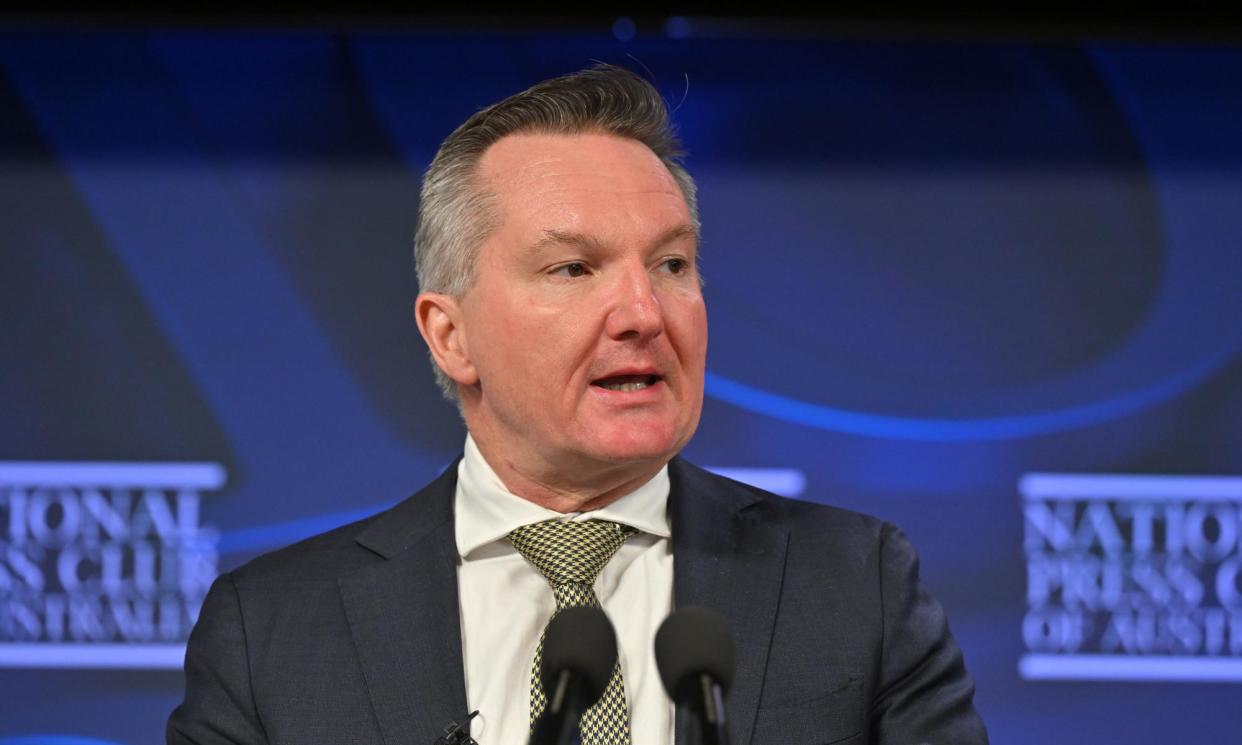Energy regulator says nuclear unlikely before 2050 as Chris Bowen attacks Coalition’s ‘risky’ plan

Australia is unlikely to be have nuclear reactors operating before 2050, more than a decade after the federal opposition’s target, according to the chair of the Australian Energy Regulator, Clare Savage.
Her comments, made to the Australian Clean Energy Summit in Sydney on Tuesday, were echoed by the federal energy minister, Chris Bowen at the National Press Club lunch in Canberra.
“It’s a tactic to divert, delay and avoid action on climate,” Bowen said. “It’s a ploy to keep coal running longer and at massive costs to reliability and emissions.”
The government is seeking to exert maximum pressure on the Coalition to answer key questions about their controversial pledge to build seven nuclear plants, including how much it would cost, how long it would take and how much power the reactors would generate.
“All the opposition has released is seven locations, that’s it,” Bowen said, adding that the next election would be a choice for Australian voters between “reliable renewables or risky reactors”.
Savage said Australia was “probably a decade too late” to go down the nuclear track. Based on her experience as a regulator, she said it would take at least two years to remove state and federal legal impediments for starters.
“By the time you would have to try and build out the safety framework, the environmental framework, the market operations, the underwriting, I reckon that’d take at least … another eight years,” Savage said. It would then need 15 years to build a reactor.
“So that’s 25 years from now, so you’re probably at 2050,” she said.
The opposition’s energy spokesperson, Ted O’Brien, told the Sydney summit the Coalition did not believe in “putting all our eggs in one basket”.
“We have a basic position which is you do not close baseload power stations prematurely,” O’Brien said, adding it was “economic lunacy” to do so before there was adequate replacement capacity “ready to go”.
“When it comes to renewables, we believe in the need for renewables to continue to roll out, but higher quality projects,” he said.
Bowen argued in his speech that “far and away the biggest threat to reliability in our grid is over reliance on ageing coal fired power stations. Over the last year, not a single day has passed without an unplanned outage at a coal power generator in eastern Australia”.
He conceded that some Australians wanted better consultation with the government and a better idea of the benefits of hosting large-scale renewable projects in their communities.
The government has been facing large community backlash over large projects such as windfarms in several east coast regional towns, with the Coalition supporting the protests.
Bowen admitted it was a “contested space”, but pushed back on a key Coalition claim that the government’s energy transition would require 28,000 kilometres of new electricity poles and wires.
The minister claimed the number was just 4,000 kilometres, with 900km of that already complete or under construction, and the rest at “advanced planning and approval” stages.
Penny Sharpe, NSW’s energy minister, also told the summits she was concerned about the federal coalition’s shift to back nuclear energy.
“We don’t have time, and we don’t have the money,” Sharpe said, adding her state was relying on $30bn in private investment to underpin the energy transition.
“It is deeply unhelpful to have this [nuclear pledge] thrown into the middle for a plan that actually won’t work,” Sharpe said.
Savage wasn’t the only regulator to raise doubts about the Coalition’s plan at the summit. Daniel Westerman, the chief executive of the Australian Energy Market Operator, told the summit on Tuesday that CSIRO in its GenCost report had shown nuclear to be “comparatively expensive, and has a long lead time”.
“Even on the most optimistic outlook, nuclear power won’t be ready in time for the exit of Australia’s coal-fired power stations,” Westerman said. “And the imperative to replace that retiring coal generation is with us now.”
According to Aemo’s blueprint for the grid, released last month, all remaining coal-fired power plants will be shut by 2038.


